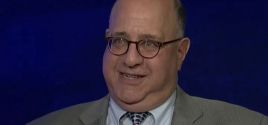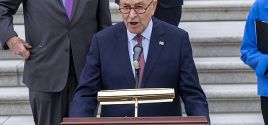Kremlin gave order to kill dissident and former spy, claims top defectorPutin angered by Chechnya criticism', 'Assassin used to be victim's friend'By Michael Binyon The TImes Nov. 20, 2006 |
Popular 
AP: 'Israeli Strikes on Gaza City of Rafah Kill 22, Mostly Children, as U.S. Advances Aid Package'

Sen. Hawley: Send National Guard to Crush Pro-Palestine Protests Like 'Eisenhower Sent the 101st to Little Rock'

John Podhoretz Demands National Guard Be Sent Into Columbia U to Put Down Pro-Palestine Protests

House Passes $95B Foreign Aid Giveaway to Israel, Ukraine and Taiwan, Combined With TikTok Ban

Senate Passes FISA Spying Bill, Includes New Measure to Turn U.S. Businesses Into NSA Spies
 Alexander Litvinenko was poisoned on the direct orders of the Kremlin because of his biting mockery of President Putin, according to a former Soviet spy now living in Britain. Oleg Gordievsky, the most senior KGB agent to defect to Britain, said that the attempt to kill Mr Litvinenko had been state-sponsored. It was carried out by a Russian friend and former colleague who had been recruited secretly in prison by the FSB, the successor to the KGB. The Italian who allegedly put poison in Mr Litvinenko’s sushi “had nothing to do with it”. “Of course it is state-sponsored. He was such an obvious enemy. Only the KGB is able to do this. The poison was very sophisticated. They have done this before — they poisoned Anna Politkovskaya (the campaigning journalist murdered on October 7) on a plane last year. Who else would know where she was sitting and could poison her food? Probably also it was the KGB that shot her.” Mr Litvinenko, who fled to Britain in 2001, was a target because of the Kremlin fury at his sarcastic attacks on President Putin, Mr Gordievsky said. “There are three people they hate: Boris Berezovsky, Akhmad Zakayev and Sasha (Alexander) Litvinenko, who was writing article after article for the Chechen press, laughing at Putin.” Mr Gordievsky, a former KGB station head in London, who still refers to the FSB by its former name, insisted that he did not know the identity of the Russian would-be killer. But he assumed that the man was a former associate of Boris Berezovsky, the former oligarch and Yeltsin confidant, who has been granted political asylum in Britain. “He used to be in Mr Berezovsky’s entourage and was imprisoned in Moscow. Then suddenly he was released, and soon after that he became a businessman and a millionaire. It is all very suspicious. But the KGB has recruited agents in prisons and camps since the 1930s. That is how they work.” The man came to London, posing as a businessman and a friend. He met Mr Litvinenko at a hotel and put poison in his tea. That was before Mr Litvinenko had lunch at a Japanese restaurant with the Italian he knew as Mario, who had arranged to meet him because he said he had information about the murder of Ms Politkovskaya, a close friend. “Why should this Italian do it? I know him. He is a solid, respectable man. And Sasha was already feeling unwell before the lunch. He was poisoned before he met the Italian.” Mario Scaramella, a consultant for a commission investigating FSB activities in Italy, was last night reported to be in protective custody “terrified for his life”. Mr Gordievsky is a close friend of the victim, who lived in North London and regularly visited Mr Gordievsky’s house in Godalming, Surrey. Talking exclusively to The Times, he painted a sad picture of the former lieutenant-colonel in the FSB. “He is rather lonely, like me. But he has a tremendous respect for me, as a British agent. He used to report to me, asking for my advice. “He said Britain was a solid, intelligent and beautiful state, with no corruption as in Russia, and he was very dedicated to it.” Mr Gordievsky said he could not go into the details of why Mr Litvinenko had agreed to meet his would-be killer. “His wife, Marina is reluctant to speak about it. It is all very hurtful, as he was a former friend. But now all that has been left to the police, and they have told his family not to talk about it.” According to Mr Gordievsky, Mr Litvinenko began to feel ill that evening. His wife called an ambulance. The crew thought that he had food poisoning and give him pills. But his condition deteriorated so the next morning they called an ambulance again. “It was only on the tenth day in hospital that the doctors realised it was not food poisoning. When his hair began to fall out they did toxicology tests, and found that his body contained three times the fatal dose of thallium,” he said. Mr Litvinenko lives close to Mr Zakayev, a close friend who suspected poisoning. It was Mr Zakayev who put the details of the case on the internet, Mr Gordievsky said. Why did it take so long to report the poisoning to the police? “Because British doctors are not familiar with such poisons. He went to the doctor, who gave him antibiotics. His wife and son kept telling the doctor that he had been poisoned, but the doctor said it was just a reaction to the antibiotics. But now he has had very good treatment for the past three days in the hospital.” John Henry, a clinical toxicologist who examined Mr Litvinenko on Saturday, said that the former spy was quite seriously sick. “There’s no doubt that he’s been poisoned by thallium, and it probably dates back to November 1, when he first started to get ill,” he told the BBC. Mr Gordievsky said those planning the murder would have to have had permission from the top. Mr Litvinenko fled to Britain after being imprisoned for a second time. In May 2005 The Times reported how someone pushed a pram containing petrol bombs at the front door of his London home. The attempted assassination left him “shaken but unhurt”. Mr Gordievsky said he was fourth — now third — on the Kremlin hitlist. The KGB had not been able to reach Boris Berezovsky as he was always surrounded by bodyguards. Mr Zakayev, the Chechen actor whom Moscow wants to extradite on terrorism charges, had no protection at home, Mr Gordievsky said, but was protected by Mr Berezovsky’s bodyguards when he went out. What about Mr Gordievsky’s own safety? “What can I do? They can always get me by shooting. But this is a small community in this country. We look after each other. So probably that is my only hope.” Blacklisted: the men wanted by Moscow Oleg Gordievsky Former deputy head of the KGB at the Soviet Embassy in London and a highly successful double agent for MI6. He joined the KGB in 1963 and was posted to Copenhagen, where he became disenchanted — a fact noticed by MI6, which recruited him. He was the KGB’s Resident-designate in London in 1982, but he was suddenly ordered back to Moscow and arrested in 1985. Although suspected and interrogated he was allowed to go home and contacted MI6, which managed to smuggle him out Boris Berezovsky Fugitive billionaire living in a Surrey and wanted in Moscow on massive fraud charges. A mathematician who began selling cars under perestroika and after the collapse of communism became Russia’s first billionaire. He became close to President Yeltsin and used his influence to increase his holdings in Aeroflot and several oil properties. Helped to finance Yeltsin’s second election campaign, then backed Putin in 2000 but the latter resented Berezovsky’s interference and opened investigations into his business dealings Ahmad Zakayev Former actor who became Minister of Culture in Chechnya — and at the start of the first Chechen war a general in the Chechen army. A political moderate, he negotiated with Russia to end the first war, and then became deputy prime minister. He was wounded in the second Chechen war and was granted political asylum in Britain in 2003. Now lives in London and is acting vice-premier of Chechnya’s underground government. Was accused by Russia of planning the Moscow theatre siege. A court turned down an extradition request, saying he was at risk of torture Leonid Nevzlin A right-hand man of Mikhail Khodorkovsky, former owner of the Yukos oil company and now in a Siberian labour camp. He has been charged in Russia of a plot to kill individuals who posed a danger to Yukos. He claims that Putin is taking revenge for supporting his political opponents. Lives in Israel Vladimir Gusinsky Former theatre director who became one of Russia’s most powerful media magnates. Fell out with the Kremlin when NTV, his independent television station, became critical of the Chechnya war. In 2000 Gusinsky was accused of embezzlement and money laundering and was forced into exile in Israel, where he holds citizenship |



